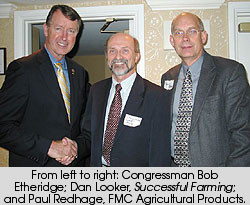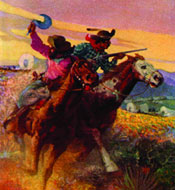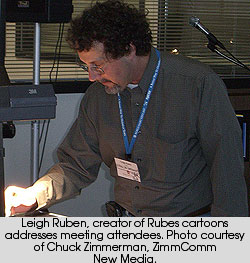 The Eastern, Chesapeake and Carolinas/Virginia NAMA chapters hosted a Tri-NAMA Chapter Agricultural Legislative Update meeting on Monday, October 1, at the Phoenix Park Hotel in Washington, DC. Nearly 40 attendees from these chapters received the latest update on the new U.S. Farm Bill and Ag Policy Issues from top legislative, administration and industry officials.
The Eastern, Chesapeake and Carolinas/Virginia NAMA chapters hosted a Tri-NAMA Chapter Agricultural Legislative Update meeting on Monday, October 1, at the Phoenix Park Hotel in Washington, DC. Nearly 40 attendees from these chapters received the latest update on the new U.S. Farm Bill and Ag Policy Issues from top legislative, administration and industry officials.
Dan Looker, Successful Farming, was the kick-off speaker for the event. Looker discussed farmer perspectives on the farm bill and the impact of current ag legislation. Looker stated that in today’s farm bill marketing loans are given to encourage farmers to sell. In addition, an efficiency payment was done away with in 1996 and replaced with counter cyclical payments. He also stated that groups such as Farm Bureau, National Farmers Union, National Corn Growers Association, etc., all want something different in the farm bill that gives them support.
 Next on the agenda was Dale Moore, Chief of Staff for the USDA, who discussed the direction of ag policy at the USDA. Moore said that some priorities for the administration are Food Safety and Trade Barriers. Ag exports are currently at $79 billion and are expected to reach $82 billion next year. In addition, products that come in to the U.S. from Panama, Peru, Korea, etc., are duty free where as products from the U.S. being brought in to their countries are not duty free and we need to find duty free access to these markets.
Next on the agenda was Dale Moore, Chief of Staff for the USDA, who discussed the direction of ag policy at the USDA. Moore said that some priorities for the administration are Food Safety and Trade Barriers. Ag exports are currently at $79 billion and are expected to reach $82 billion next year. In addition, products that come in to the U.S. from Panama, Peru, Korea, etc., are duty free where as products from the U.S. being brought in to their countries are not duty free and we need to find duty free access to these markets.
According to Moore, proposed changes to the new Farm Bill include allowing specialty crops in the participation of the farm bill; a proposed tax increase; including money for Bioenergy and conservation in the farm bill.
Following Moore’s presentation, U.S. Congressman Bob Etheridge continued with the farm bill and stated that the new farm bill doesn’t have the budget surplus as in the last bill. He included that more money will be put towards conservation and specialty crops in the new farm bill. Etheridge stated that there was a lot of pressure to eliminate Farm Safety issues from the Farm bill but they were saved. In addition, there is more money for conservation in this farm bill than ever before. These are the two most important issues in maintaining our food supply. Funding for research on biofuels will also be included in the farm bill. The bill will extend tax credits on biofuels to get more people involved. Etheridge was asked about his thoughts on homeland security and agriculture safety and inspections. “We’re probably going to see an increase in inspections,” says Etheridge, “because the consumers are going to require it.” He continued, “If we don’t, we lose what I like to call the ‘Gold Seal’ stamp by the USDA.”
The last speaker of the day was Robbie Minnich, Senior Government Relations Representative for the National Cotton Council. Minnich discussed how the new farm bill will affect commodity programs and issues that the Cotton Council will face when the new farm bill is implemented.
Special thanks to those North Carolina State University students who were able to attend the event.
Thanks also goes to the bus sponsors for this event. These sponsors were key in providing transportation for attendees to Washington, D.C. Thanks to:
Quarry Integrated Communications
R.F. Timberlake & Company, Inc.
Southern States
Gibbs & Soell
For more information on chapter meetings and events visit https://www.namablog.org/?page_id=16.
 The early registration deadline and hotel cut-off date for the 2007 Agribusiness Forum is Monday, October 29. After October 29, registration rates will increase and any hotel reservations made after October 29 are subject to higher rates and potential unavailability.
The early registration deadline and hotel cut-off date for the 2007 Agribusiness Forum is Monday, October 29. After October 29, registration rates will increase and any hotel reservations made after October 29 are subject to higher rates and potential unavailability. “It’s a big world out there,” the saying used to go. But increasingly, globalization and technology are making our world smaller and smaller. Events on the other side of the globe impact the way we do business. The internet and cellular technology have revolutionized the pace of communication, presenting new challenges and opportunities for us as marketers.
“It’s a big world out there,” the saying used to go. But increasingly, globalization and technology are making our world smaller and smaller. Events on the other side of the globe impact the way we do business. The internet and cellular technology have revolutionized the pace of communication, presenting new challenges and opportunities for us as marketers. The NAMA Trade Show – the Connection Point – will be held in conjunction with the Agri-Marketing Conference, April 16-18, 2008, in Kansas City, MO, at the Hyatt Regency Crown Center.
The NAMA Trade Show – the Connection Point – will be held in conjunction with the Agri-Marketing Conference, April 16-18, 2008, in Kansas City, MO, at the Hyatt Regency Crown Center. NAMA is proud to announce 2 new additions in the Advocate Program. The goal of the new advocates is to help recruit new members and advocate for the organization.
NAMA is proud to announce 2 new additions in the Advocate Program. The goal of the new advocates is to help recruit new members and advocate for the organization. Mark your calendars for the regional/chapter Best of NAMA Ceremonies. These ceremonies are celebrations of those entries that won first or merit in the regional competition.
Mark your calendars for the regional/chapter Best of NAMA Ceremonies. These ceremonies are celebrations of those entries that won first or merit in the regional competition. The Eastern, Chesapeake and Carolinas/Virginia NAMA chapters hosted a Tri-NAMA Chapter Agricultural Legislative Update meeting on Monday, October 1, at the Phoenix Park Hotel in Washington, DC. Nearly 40 attendees from these chapters received the latest update on the new U.S. Farm Bill and Ag Policy Issues from top legislative, administration and industry officials.
The Eastern, Chesapeake and Carolinas/Virginia NAMA chapters hosted a Tri-NAMA Chapter Agricultural Legislative Update meeting on Monday, October 1, at the Phoenix Park Hotel in Washington, DC. Nearly 40 attendees from these chapters received the latest update on the new U.S. Farm Bill and Ag Policy Issues from top legislative, administration and industry officials. Next on the agenda was Dale Moore, Chief of Staff for the USDA, who discussed the direction of ag policy at the USDA. Moore said that some priorities for the administration are Food Safety and Trade Barriers. Ag exports are currently at $79 billion and are expected to reach $82 billion next year. In addition, products that come in to the U.S. from Panama, Peru, Korea, etc., are duty free where as products from the U.S. being brought in to their countries are not duty free and we need to find duty free access to these markets.
Next on the agenda was Dale Moore, Chief of Staff for the USDA, who discussed the direction of ag policy at the USDA. Moore said that some priorities for the administration are Food Safety and Trade Barriers. Ag exports are currently at $79 billion and are expected to reach $82 billion next year. In addition, products that come in to the U.S. from Panama, Peru, Korea, etc., are duty free where as products from the U.S. being brought in to their countries are not duty free and we need to find duty free access to these markets. Nearly 50 NAMA members from California, North Central, MoKan and other chapters joined Badger members at a NAMA reception sponsored by the Badger chapter at World Dairy Expo in Madison, Wisconsin on Thursday, October 4.
Nearly 50 NAMA members from California, North Central, MoKan and other chapters joined Badger members at a NAMA reception sponsored by the Badger chapter at World Dairy Expo in Madison, Wisconsin on Thursday, October 4. The World Dairy Expo reception was the kick-off to a year of exciting new programs for Badger NAMA. Upcoming events for 2007-2008 include:
The World Dairy Expo reception was the kick-off to a year of exciting new programs for Badger NAMA. Upcoming events for 2007-2008 include: